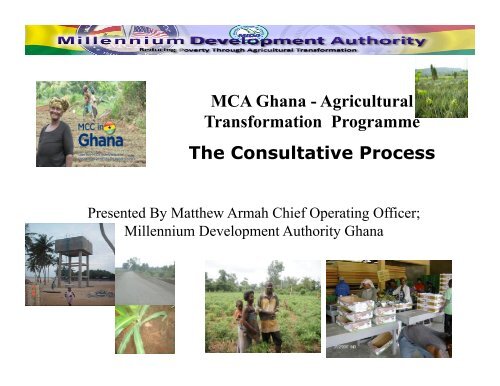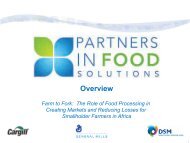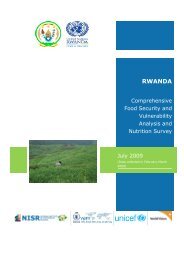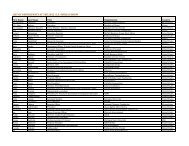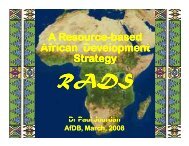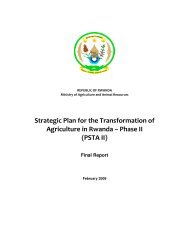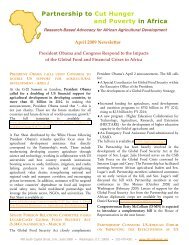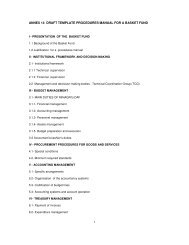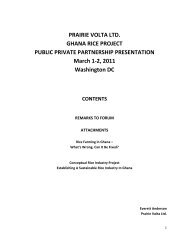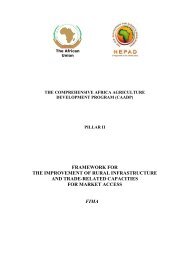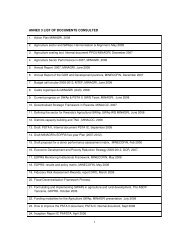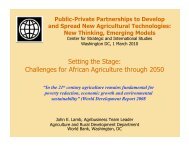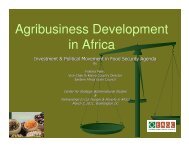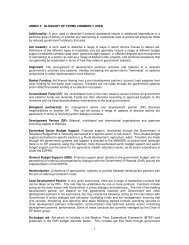MCA Ghana - Partnership to Cut Hunger and Poverty in Africa
MCA Ghana - Partnership to Cut Hunger and Poverty in Africa
MCA Ghana - Partnership to Cut Hunger and Poverty in Africa
You also want an ePaper? Increase the reach of your titles
YUMPU automatically turns print PDFs into web optimized ePapers that Google loves.
<strong>MCA</strong> <strong>Ghana</strong> - Agricultural<br />
Transformation Programme<br />
The Consultative Process<br />
Presented By Matthew Armah Chief Operat<strong>in</strong>g Officer;<br />
Millennium Development Authority <strong>Ghana</strong>
<strong>MCA</strong> <strong>Ghana</strong> Agricultural Transforma5on Programme <br />
• The Millennium Challenge Compact signed on 1 st <br />
August 2006 <strong>and</strong> Entered In<strong>to</strong> Force on 16 th of February <br />
2007. <br />
• Millennium Development Authority (MiDA) is the <br />
Accountable En5ty for the <strong>MCA</strong> <strong>Ghana</strong> Program <br />
established by Parliament Acts 702 <strong>and</strong> 709 (Amended), <br />
2006. <br />
• Head Office <strong>in</strong> Accra <strong>and</strong> Zonal Offices located <strong>in</strong> <br />
Donkorkrom, Tamale <strong>and</strong> Bawjiase <strong>in</strong> the three <br />
Interven5on Zones. <br />
• <strong>MCA</strong> <strong>Ghana</strong> Programme is opera5ng <strong>in</strong> 30 Districts.
MCC <strong>Ghana</strong> Compact 3<br />
Implementation Zones<br />
The <strong>Ghana</strong> Compact:<br />
$547 million<br />
signed August 1 st , 2006<br />
Website www.mida.gov.gh<br />
Intervention zones <strong>in</strong>clude Northern Zone (yellow), Afram 3<br />
Bas<strong>in</strong> (green), <strong>and</strong> Southern Zone (brown)
GHANA <strong>MCA</strong> PROGRAM<br />
GHANA COMPACT<br />
PROGRAM GOAL<br />
REDUCTION OF POVERTY THROUGH ECONOMIC<br />
GROWTH LED BY AGRICULTURAL<br />
TRANSFORMATION<br />
PROGRAM<br />
OBJECTIVES<br />
1.Increase Production <strong>and</strong> Productivity of High Value Cash <strong>and</strong> Food Crops <strong>in</strong> 3 Selected Zones of <strong>Ghana</strong><br />
2.Enhance the Competitiveness of High Value Cash <strong>and</strong> Food Crops <strong>in</strong> Local <strong>and</strong> International Markets<br />
PROJECTS<br />
Agriculture Project <br />
($241 million) <br />
• Increased Farmer & Enterprise <br />
Tra<strong>in</strong><strong>in</strong>g <strong>in</strong> Commercial Agriculture <br />
• Increased Irriga5on Development <br />
• L<strong>and</strong> Tenure Facilita5on <br />
• Improved Post‐Harvest H<strong>and</strong>l<strong>in</strong>g <strong>and</strong> <br />
Value Cha<strong>in</strong> Services <br />
• Improved Access <strong>to</strong> Credit On Farm <br />
<strong>and</strong> Value Cha<strong>in</strong> Services. <br />
• Improved L<strong>in</strong>kages <strong>to</strong> Farml<strong>and</strong>s <strong>and</strong> <br />
Markets – Rehabilita5on of Feeder <br />
Roads (950km) <br />
Transporta=on Project <br />
($143 million) <br />
• Enhanced access <strong>to</strong> Air <strong>and</strong> <br />
Sea Ports – Upgrade <strong>to</strong> N1 <br />
Sec5ons <br />
• Improved Trunk Road Network <br />
In Afram Bas<strong>in</strong> (230km) <br />
• Improved Volta Lake Ferry <br />
Services <br />
Rural Development Project<br />
($101 million)<br />
• Support for Community<br />
Services<br />
– Energy for Domestic <strong>and</strong><br />
Commercial Uses<br />
– Water & Sanitation<br />
Facilities<br />
– Educational <strong>and</strong><br />
Vocational Facilities<br />
• Strengthen Rural F<strong>in</strong>ancial<br />
Institutions<br />
• Strengthen Public Sec<strong>to</strong>r<br />
Procurement Capacity<br />
15 May 2006
THE MiDA STRATEGY <br />
• To help the rural poor par5cipate <strong>in</strong> local <strong>and</strong> <br />
<strong>in</strong>terna5onal markets through <strong>in</strong>vestments that; <br />
– enable communi5es become be_er organized through tra<strong>in</strong><strong>in</strong>g <br />
<strong>and</strong> Commercial Development of Farmer Based Organiza5ons ; <br />
– improve quality of produce; <br />
– diversify agricultural output; <br />
– add value <strong>to</strong> primary products through agro‐based process<strong>in</strong>g. <br />
– provide rural agricultural communi5es with greater access <strong>to</strong> <br />
credit; <br />
– Reduce the cost of transporta5on of agric produce; <br />
– provide a range of necessary rural facili5es, <strong>in</strong>clud<strong>in</strong>g those <br />
rela5ng <strong>to</strong> <strong>in</strong>put <strong>and</strong> output marke5ng, <strong>and</strong> f<strong>in</strong>ancial services.
Presenta5on Outl<strong>in</strong>e <br />
– Reflect on the <strong>MCA</strong>’s experience <strong>in</strong> <strong>Ghana</strong> <strong>in</strong> conduc5ng <br />
dialogues with; <br />
– farmers, the private sec<strong>to</strong>r, <strong>and</strong> other members of civil <br />
society <strong>in</strong> order <strong>to</strong> arrive at priori5es for <strong>Ghana</strong>’s MCC <br />
Compact. <br />
– Who was <strong>in</strong>volved <br />
– What were the ma<strong>in</strong> constra<strong>in</strong>ts <strong>and</strong> priori5es iden5fied <br />
– And how have these groups rema<strong>in</strong>ed engaged through <br />
the implementa5on of the Compact <br />
– What are he lessons of this approach for the Food <br />
Security Ini5a5ve
• The Goal of the <strong>Ghana</strong> <strong>Poverty</strong> Reduc5on Strategy <br />
(GPRS), approved by Parliament of <strong>Ghana</strong> <strong>in</strong> February <br />
2003 was, growth, poverty reduc=on, <strong>and</strong> protec=on of <br />
the vulnerable with<strong>in</strong> a democra5c environment (<strong>to</strong> <br />
promote par5cipa5on <strong>in</strong> decision‐mak<strong>in</strong>g at all levels, <br />
<strong>and</strong> private sec<strong>to</strong>r‐led growth. <br />
– developed through extensive consulta5on across the country, <br />
<strong>in</strong>volv<strong>in</strong>g local <strong>and</strong> central government, civil socie5es, NGOs, <br />
organized labor groups, <strong>and</strong> private sec<strong>to</strong>r organiza5ons. <br />
• This was <strong>to</strong> ensure ownership across the country <strong>and</strong> <br />
deepened the role of civil society <strong>and</strong> other groups <strong>in</strong> <br />
the development of strategies for development.
<strong>Ghana</strong> Compact Development Consulta5ve Process <br />
• The <strong>Ghana</strong> <strong>MCA</strong> Proposal takes its orig<strong>in</strong>s from <br />
the GPRS <strong>and</strong> hence is also guided by the key <br />
pr<strong>in</strong>ciples of ownership <strong>and</strong> <strong>in</strong>clusiveness. <br />
• The consulta5ve processes consisted of <br />
presenta5ons, open discussions, group work, <br />
plenary discussions, <strong>and</strong> ques5on <strong>and</strong> answer <br />
sessions. <br />
• More than fiheen consulta5ve mee5ngs were <br />
held, with an average par5cipa5on of about <br />
forty stakeholders per mee5ng.
The Objec=ve for the Consulta=ve Process <br />
• To select a priority program which is countryowned; <br />
• <strong>in</strong> l<strong>in</strong>e with government’s broad development <br />
strategy, <br />
• Build synergies with exis5ng programs; <br />
• Promote accountability, transparency <strong>and</strong> <br />
susta<strong>in</strong>ability <strong>in</strong> the delivery of outcomes.
Structure of the <strong>MCA</strong>‐ <strong>Ghana</strong> Consulta5on Process.
Process Identified Constra<strong>in</strong>ts <strong>in</strong> the Ag. Value Cha<strong>in</strong><br />
Out-growers<br />
Subsistence<br />
Farmers<br />
PRODUCTION<br />
Nucleus Farms /<br />
Buyers & Traders<br />
PROCESSING/QUALITY MANAGEMENT<br />
Pack Houses /<br />
Grad<strong>in</strong>g-S<strong>to</strong>rage<br />
Improved Transport &<br />
Refrigerated Trucks<br />
Gra<strong>in</strong> Silos,<br />
Process<strong>in</strong>g &<br />
Perishable Cargo<br />
Centres<br />
MARKETING<br />
Local<br />
INCREASED<br />
EARNINGS<br />
Process<strong>in</strong>g plants/<br />
Value added<br />
Export<br />
Constra<strong>in</strong>ts<br />
• Acquisition of l<strong>and</strong><br />
• Access roads/transport<br />
systems<br />
• Irrigation/all year prod<br />
• Technology<br />
• Input supply system<br />
• Energy<br />
• Post Harvest Infrastructure<br />
• Quality management<br />
• International st<strong>and</strong>ards<br />
• Ports/shipment facilities<br />
• Equipment<br />
• Technical know-how<br />
• Promotion <strong>and</strong> market<strong>in</strong>g<br />
• Local<br />
• Regional <strong>and</strong> <strong>in</strong>ternational<br />
• Developed local, regional <strong>and</strong><br />
foreign markets<br />
• Policy environment<br />
Capital , Management, Technical Assistance, & Policy co ord<strong>in</strong>ation/ reforms<br />
INTEGRATED PROGRAMME TO REMOVE IDENTIFIED CONSTRAINTS TO GROWTH IN THE AGRI BUSINESS SECTOR
An opportunity for Consulted groups <strong>to</strong> rema<strong>in</strong> engaged <br />
<strong>in</strong> Compact implementa=on: MiDA Board Composi=on; <br />
• (a) the chairperson, <br />
• (b) the M<strong>in</strong>isters or the representa2ves of the M<strong>in</strong>isters of; <br />
– (i) Food <strong>and</strong> Agriculture, <br />
– (ii) Trade, Industry, Private Sec<strong>to</strong>r <strong>and</strong> PSI, <br />
– (iii) Local Government, Rural Development <strong>and</strong> Environment, <strong>and</strong> <br />
– (iv) F<strong>in</strong>ance <strong>and</strong> Economic Plann<strong>in</strong>g, <br />
• (c) The Chief Execu2ve Officer, <br />
• (d) two representa2ves of the Private Sec<strong>to</strong>r selected by the Private Enterprises <br />
Founda2on through a transparent process, <br />
• (e) one representa2ve of civil society organisa2ons selected by the <strong>Ghana</strong> <br />
Associa2on of Private Voluntary Organisa2ons <strong>in</strong> Development through a <br />
transparent process <br />
• (a) one representa5ve of the MCC, (Non Vo=ng ) <br />
• (b) three persons represen2ng the District Assemblies with<strong>in</strong> each Interven2on <br />
Zone selected by the District Assemblies <strong>in</strong> the zones through a transparent <br />
selec2on process (Non Vo=ng )
Consulted Groups Rema<strong>in</strong> Engaged <strong>in</strong> Compact <br />
Implementa=on ‐ Zonal Advisory CommiWee <br />
• The Zonal Advisory CommiWee (ZAC) is a Compact <br />
implementa5on requirement. Sec5on 3(e) of the <br />
Governance Agreement requires the Government of <br />
<strong>Ghana</strong> “<strong>to</strong> ensure the establishment of three (3) zonal <br />
advisory commi_ees”; one each for the three zones <br />
mak<strong>in</strong>g up the Programme footpr<strong>in</strong>t. <br />
• However by a resolu5on passed by the MiDA Board the <br />
zonal advisory process has been broken down <strong>to</strong> the <br />
district level i.e. District Advisory Commi_ee (DAC).
The Mechanism <br />
• The ZAC/DAC is a mechanism <strong>to</strong> provide representa5ves of the private <br />
sec<strong>to</strong>r, civil society <strong>and</strong> local <strong>and</strong> regional governments the opportunity <strong>to</strong> <br />
provide advice <strong>and</strong> <strong>in</strong>put <strong>to</strong> MiDA regard<strong>in</strong>g the implementa5on of the <br />
Compact. <br />
• Each DAC shall have an opportunity <strong>to</strong> provide regularly <strong>to</strong> MiDA its views <br />
or recommenda5on on the performance <strong>and</strong> progress on the projects <strong>and</strong> <br />
project ac5vi5es, any implementa5on document, procurement, f<strong>in</strong>ancial <br />
management or such other issues as may be presented from 5me <strong>to</strong> 5me <br />
<strong>to</strong> each DAC or as otherwise raised by each DAC. <br />
• Each DAC shall be comprised, unless otherwise agreed by the par5es of <br />
the follow<strong>in</strong>g: a district plann<strong>in</strong>g officer, district direc<strong>to</strong>r of agriculture, <br />
district chief execu5ve officer, an elected representa5ve of the district <br />
assembly, the regional environmental officer of the region where the <br />
district is <strong>and</strong> civil society stakeholders <strong>in</strong> the district.
The lessons of this approach for the Food Security Ini=a=ve <br />
• Ownership <strong>and</strong> Inclusiveness is a Pre‐requisite for a <br />
successful Food Security Ini5a5ve; <br />
• Simplicity of the Programme Logic is key <br />
• Flexibility <strong>in</strong> Programme Implementa5on <strong>to</strong> <br />
accommodate unan5cipated challenges is vital <strong>and</strong> <br />
• Robust Moni<strong>to</strong>r<strong>in</strong>g & Repor5ng are the lifel<strong>in</strong>e <strong>to</strong> <br />
con5nued engagement of the consulted groups.
Current Status<br />
Hopes & Aspirations
THANK YOU<br />
18


